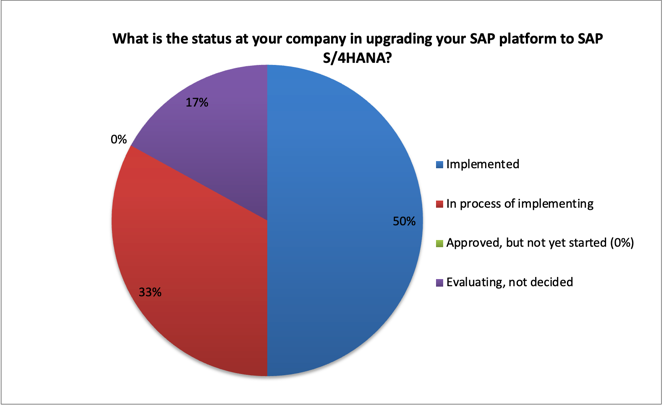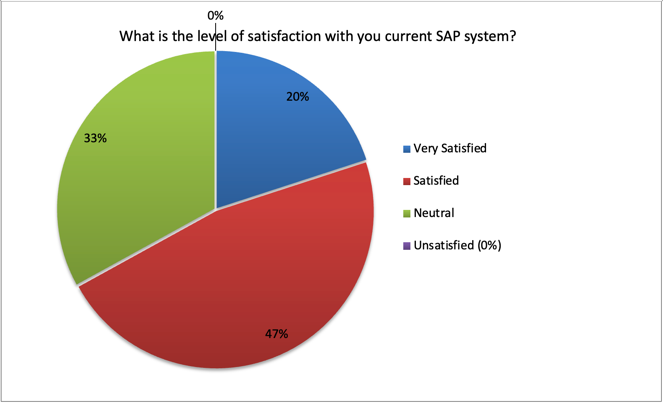Implementing SAP S/4HANA for Shared Services/GBS
Introduction
As described in an article at Techtarget.com (click here for the article), “SAP HANA (High-performance ANalytic Appliance) is a multi-model database that stores data in its memory instead of keeping it on a disk. This results in data processing that is magnitudes faster than that of disk-based data systems, allowing for advanced, real-time analytics… S/4HANA was designed to make ERP more modern, faster and easier to use through a simplified data model, lean architecture and a new user experience built on the tile-based SAP Fiori UX. S/4HANA includes or is integrated with a number of advanced technologies, including AI, machine learning, and advanced analytics. The SAP HANA in-memory database architecture and the integration of advanced technologies allow S/4HANA to help solve complex problems in real time and analyze more information faster than previous SAP ERP products.” In other words, it is a major change to the underlying ERP software of SAP, and while it can deliver great benefit to the entire enterprise, it is a significant challenge to implement.
Company Experience
A Peercast discussion in Peeriosity-100’s Global Business Services research area featured a global company with over $10B in annual revenue discussing their approach to implementing SAP S/4HANA for Global Business Services (GBS).
As background, the feature company’s GBS organization is mature, having launched in the US almost 15 years ago, followed in successive years with GBS launches in Manila and Mexico. While the original focus was on process optimization, about 5 years ago they added Centers of Excellence capabilities for Automation and Reporting, and in the past few years have been focused on implementing a Global Process Ownership model, service expansion, greater process standardization, and talent upskilling.
For the implementation of SAP S/4HANA, to achieve the greatest benefit, they created separate work teams that were cross-functional and highly collaborative. The implementation included three guiding principles:
- The S/4HANA project is business led. This important principal guided every aspect of the project.
- The collaboration of business leads is critical to setting priorities and successfully implementing an end-to-end process design.
- Testing, testing, and more testing is required to ensure a successful implementation.
The project includes workstreams for Finance processes, Order-to-Cash, and Supply Chain, with enabling teams for data migration, reporting & analytics, security, and platform architecture.
The discussion then focused on their approach to data migration, and reporting & analytics. Some key learning regarding data migration include:
- No more copies, data must always connect directly to the source system.
- Centralize Master Data to enable better governance of master data across markets and business units.
- Cleanse data before migration in the source system before bringing it into S4.
- No history is migrated, unless the business can prove the value of historic data. Providing access to historic data can be done, if necessary, without that data being migrated into S4.
- Business owns the data, with every data object initially owned by an implementation team, and eventually by the business.
Some of the lessons learned with the data migration include: 1) treat every dress-rehearsal as if it is a go-live, and document solutions for issues so there is a clear plan of action at go-live, and 2) understand the requirements of all downstream systems, and include those requirements in test plans.
iPolling Results Review
A Peeriosity-100 poll was created to get insight into the status of member companies who are using SAP regarding their implementation of SAP S/4HANA.
The first of two poll questions asked about the status at the company in upgrading their SAP platform to SAP S/4HANA. 50% indicated they have implemented, with 33% in the process implementing, no one approved but not yet started, and 17% evaluating and not decided. It is interesting to note that when this poll was conducted 18 months ago, only 21% indicated they had implemented, with 65% having approved projects, but they had not yet started to implement.

The next polling question asked about the level of satisfaction Peeriosity member companies have with their current SAP system. Overall satisfaction levels are high, with 20% indicating they are very satisfied, 47% who are satisfied, and 33% who are neutral. These results indicate a slight uptick in satisfaction levels from two years ago.

A couple of the comments from members include:
- We have implemented Europe, are implementing Asia, and starting to implement for North America and Latin America.
- Timing is To Be Determined.
Closing Summary
With SAP the system of choice for many Peeriosity members, it’s no surprise that SAP S/4HANNA is a high priority. For most companies the transition is a multi-year effort that will consume significant resources for both the implementation and getting processes ready to take advantage of the new capabilities. Fortunately, Peeriosity members are able to ask questions and develop their network of trusted peers, allowing them to gather insights and lessons learned from a cross-section of peers who are facing a similar challenge.
If your company is on SAP, have you implemented S/4HANA? With a project that is a game-changer, what are your priorities and how prepared is your organization to optimize the new capabilities?
Who are your peers and how are you collaborating with them?
_______________________________________________________________________________
“Peercasts” are private, professionally facilitated webcasts that feature leading member company experiences on specific topics as a catalyst for broader discussion. Access is available exclusively to Peeriosity-100 member company employees, with consultants or vendors prohibited from attending or accessing discussion content. Members can see who is registered to attend in advance, with discussion recordings, supporting polls, and presentation materials online and available whenever convenient for the member. Using Peeriosity-100’s integrated email system, Peer Mail, attendees can easily communicate at any time with other attending peers by selecting them from the list of registered attendees.
“Polling” is available exclusively to Peeriosity-100 member company employees, with consultants or vendors prohibited from participating or accessing content. Members have full visibility to all respondents and their comments. Using Peeriosity-100’s integrated email system, Peer Mail, members can easily communicate at any time with others who participated in Polling.

